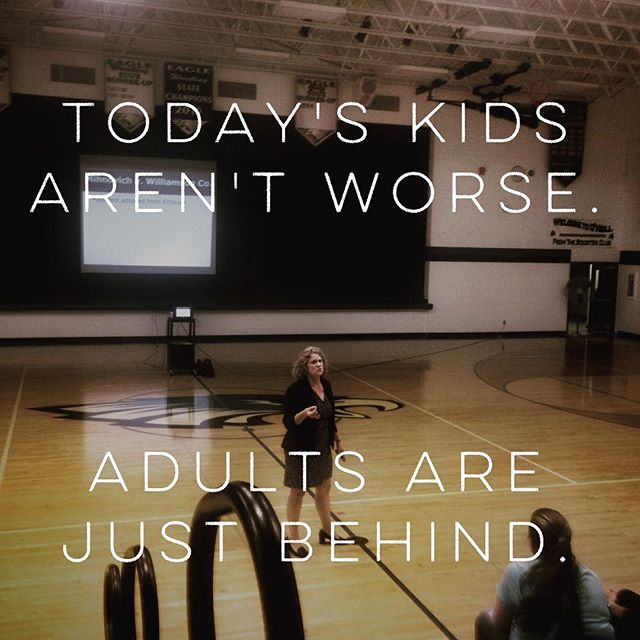Karen, a self-proclaimed expert in online behaviors and consequences, specifically with youth, speaks with deep knowledge and expertise. She frequently presents across the state of Nebraska and beyond on issue related to cyberbullying, sexting, and online safety. Her multi-faceted message was well received by the three audiences she addressed: 6th-8th grades, 9th-12th grades, and parents/community members. You can view her presentation to the 6th-8th graders by viewing O'Neill's Eagle Eye Broadcasting recording here:
http://thecube.com/event/digital-citizenship-presentation-karen-haase-526913
Karen's message is direct and impactful. Her law firm's mission rings true in her passionate delivery of content.
At KSB School Law we aren’t stereotypical stuffy, pretentious or coldhearted lawyer-types, who always speak in long paragraphs and write with a bunch of Latin terms. We are passionate about public education and about serving the needs of our public school clients. We advocate zealously for our clients in legal and other forums. We speak and write clearly – we avoid using a lot of legal “mumbo jumbo” when we can, so that our clients and others can understand the important issues that need to be addressed. We are not afraid to speak bluntly to our clients when necessary. As a result we have forged deep relationships with each other and with our clients. We truly love what we do! (from http://www.ksbschoollaw.com on 8-28-15)Whether we are a student just entering the online world of social media, or a teen who has already established an online presence, or an adult attempting to navigate these uncertain waters, each of us has much to learn.
Karen spoke passionately about not banning or blocking access to digital tools, but rather proactively participating and modeling positive behaviors in online collaborative spaces. In her words, "Kids today aren't worse. Adults are just behind."
Some of the many alarming statistics Karen shared with her audiences included:
- 6 billion hrs of YouTube watched every minute
- 95% of all teens have presence “online”
- 70% of 12-13 old have cell phones
- 91% of kids take/send/receive photos
- daily teen texting up 200% since 2012
- 205% increase in terroristic threats with teenagers in NE
- 57% have been asked to send a sext before they graduate
Talk to your kids about what they will say WHEN they are asked to send a sext, because they will be asked. A humorous, but real comment that Karen once heard was, “Yes I will send you a naked pic of myself when you send one of yourself to my dad.”
Although no social media tool is ever 100% private or safe, there are precautions that we as adults should be aware of. We should require our children to friend us on all social networks they use and monitor what they post.
Encourage our students to hold locked Twitter accounts. With these, others can’t retweet their tweets, protecting students from additional damages. Also, you can set it up so that you get a text message every time certain people tweet. This makes sense with our own children.
Encourage our students to hold locked Twitter accounts. With these, others can’t retweet their tweets, protecting students from additional damages. Also, you can set it up so that you get a text message every time certain people tweet. This makes sense with our own children.
Kids will claim that Snapchat is safe as the messages seem to delete after the receiver views them. Karen explained that there are apps that send you a copy of every thing you receive on snapchat (with no notifications to sender) and our kids should be aware.
Nothing in cyberspace is private. Talk through consequences - both short and long term. Kik Messenger is one app that we could completely discourage. It is full of pedophiles and not secure.
When our kids are gaming we need to ask them to take off the headsets so that we can hear what they hear. Be active and involved. Talk to our kids about everything and remind them that a stranger online is just as dangerous as a stranger in real life. Hackers hack in while kids leave game stations running in background; this is a weakness that hackers have discovered. Kids need to know not to put cell phone numbers anywhere online.
It is more than acceptable to check up on our children with access to digital devices. Don’t let children charge phones in bedrooms and keep computers in public parts of house. In Karen's house all devices have a 10:00 curfew.
We can demonstrate the reality that nothing is truly anonymous by google searching our children's names. Setting up google alerts on kids is another best practice for monitoring their online safety.
The issues involved with digital citizenship today far surpass what one can learn about in an hour long presentation. To learn even more, consider bringing a team to the Digital Citizenship Symposium on October 12. ESU 8 schools can send a team of participants (perhaps including teacher, administrator, parent, and students) to ESU 7 in Columbus. Here they will hear from Karen Haase and others and spend the day discussing an action plan to bring back to their communities.


No comments:
Post a Comment